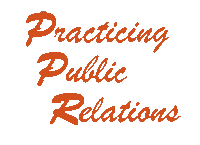No one knows. No one can predict what tomorrow will bring let alone what may or may not occur during a lifetime career in public relations. What I can tell you, and what I've written elsewhere, is that countless books, articles, and news stories offer urgent warnings about the increasing likelihood of facing a major public relations crisis regardless of what kind of business, industry, or non-profit organization employs you.
Even if you end up being one of the lucky ones who never face a crisis, the possibility of confronting one deserves consideration and advance planning. You need to pay attention to what's happening around you and keep up to date on current trends in crisis occurrence and crisis response techniques. But, unless you work for a high profile organization in a high-risk environment, crisis planning needn't be a daily concern.
The paragraph above was written before Covid-19 changed the world, at a time when there still could be "lucky ones who never face a crisis." Covid-19 has changed that. There is now no one living who will not, at the very least, have experienced the Covid crisis, a true pandemic that has put the entire world at risk. It's briefly discussed in Covid-19 has taken previous notions of "crisis response" to a whole new level, my latest addition to this collection of articles.
One of the best ways to keep up with crisis trends is to read the Annual ICM Crisis Reports published by the Institute for Crisis Management (ICM) of South Bend, Indiana. It's been doing crisis communication planning, training, and consulting for Fortune 500 companies and small businesses around the world since 1990. Its Annual Crisis Report summarizes the crises that hit each year and analyze the news coverage they triggered. They're a wonderful way to maintain a clear perspective on the need for crisis management. Here's a link to the latest ICM Annual Crisis Report.

